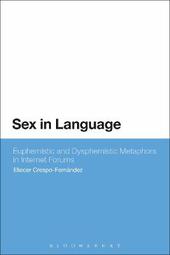
|
Sex in Language: Euphemistic and Dysphemistic Metaphors in Internet forums
Paperback / softback
Main Details
| Title |
Sex in Language: Euphemistic and Dysphemistic Metaphors in Internet forums
|
| Authors and Contributors |
By (author) Eliecer Crespo-Fernandez
|
| Physical Properties |
| Format:Paperback / softback | | Pages:248 | | Dimensions(mm): Height 234,Width 156 |
|
| Category/Genre | Sociolinguistics
Semantics |
|---|
| ISBN/Barcode |
9781350024267
|
| Classifications | Dewey:306.44 |
|---|
| Audience | | Professional & Vocational | |
|---|
|
Publishing Details |
| Publisher |
Bloomsbury Publishing PLC
|
| Imprint |
Bloomsbury Academic
|
| Publication Date |
23 February 2017 |
| Publication Country |
United Kingdom
|
Description
Metaphor has long provided a rich way to speak about the unspeakable, to refer to delicate issues. Sex is one such area. This book follows a cognitive-linguistic and relevance-theoretic approach to the language of sex, considering metaphor as a bridge that brings together mind and language. It does this through the analysis of the antithetical mechanisms of verbal mitigation and offence. These two mechanisms are (more commonly know as) euphemism and (its lesser known companion term) dysphemism. The volume reflects on the social and communicative functions that sexual metaphors perform in a sample of almost two hundred postings taken from internet forums. How do people think about sex? How do people avoid talking about sex? How do people paraphrase sexual topics? It offers an account of how real language users understand sexual taboo in present-day English and also a great grounding in manual corpus work on a qualitative level.
Author Biography
Eliecer Crespo-Fernandez is Lecturer at the Department of Modern Languages, University of Castile-La Mancha, Spain.
ReviewsCrespo-Fernandez's book is an interesting contribution to the field of linguistic taboo and conceptual metaphor and has insightful reflections at the semantic, pragmatic and cultural levels. ... [His] analyses provide critical insights into heteronormative discourses present in metaphorical expressions. ... These results could contribute to understanding gender conflicts, which makes Sex in Language a recommendable read both inside and outside of the academic community. * ATLANTIS: Journal of the Spanish Association of Anglo-American Studies * I strongly believe that [Crespo-Fernandez's] analysis of the 283 euphemistic and dysphemistic metaphorical items offers significant and valid results regarding the way sexual topics are conceptualized in English and American cultures. ... Sex in Language makes a useful contribution to current research in language, cognition and sexuality. It is well-structured, the author uses up-to-date literature and, as Keith Allan recognizes in the foreword, it is 'entertaining to read'. ... This book will be of interest to readers working in diverse areas of English linguistics. * Australian Journal of Linguistics * Sex in Language is an impressive volume ... The great number of examples and illustrations which the author provides makes the manuscript extremely attractive. ... Written in an accessible style, this is a book that allows the reader to get familiar with the theoretical background affecting metaphors, X-phemisms and cognitive linguistics in general, in which the author goes a step further than traditional lexical approaches applied to this type of study. * Folia Linguistica * The focus on and analysis of metaphors used in speaking about sexual body parts, effluvia, acts, and accessories is the main strength of the present work .. Sex in Language is entertaining to read * Keith Allan, from the 'Foreword' * Clearly structured, well-argued and makes an important contribution to the sociolinguistic and pragmatic research field. It is certain to find a wide readership among scholars and students of languages, linguistics and social theory. I strongly recommend it. * Professor Andreas Mussolf, University of East Anglia, UK * The reader will be immersed in both the highest and most up-to-date academic theories on metaphor and euphemism as well as the actual (and sometimes inappropriate) language people use in internet forums on sex. It fills a gap in the literature on the language about sex and sexual relations. -- Pedro J. Chamizo-Dominguez, Lecturer in Philosophy of Language, University of Malaga, Spain Eliecer Crespo explores the metaphorical motivation of the language used to talk about such a pervasive, yet 'uncomfortable', topic as sex, and does so with a scholarly rigor highly commendable. The book offers an exhaustive discussion on the metaphorical motivation of the euphemistic and dysphemistic strategies real people use to discuss sex in real interaction. By combining insights and methods from such diverse approaches as discourse analysis, cognitive metaphor theory, corpus linguistics, appraisal theory and pragmatics, Crespo goes beyond the lexical approach too often adopted in research on the figurative motivation of taboo-induced expressions and avoidance strategies to provide a full account of the (inter)personal, pragmatic, and socio-cultural dimension of metaphor and its heuristic role to deal with one of the most basic --and, therefore, unavoidable-- domains of human experience. -- Maria del Rosario Caballero Rodriguez, Senior Lecturer in English Linguistics, Universidad de Castilla-La Mancha, Spain
|